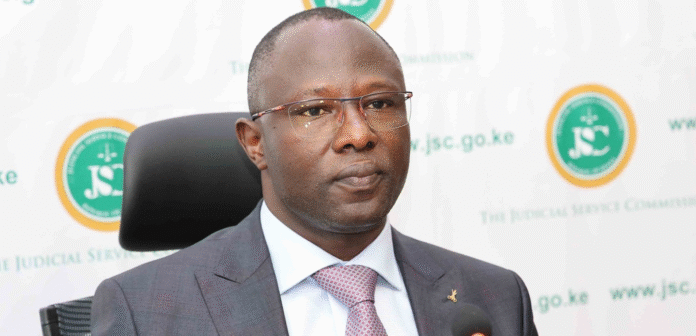The Justice and Legal Affairs Committee (JLAC) will vet the seven nominees to the Independent Electoral and Boundaries Commission (IEBC) on Saturday, May 31, following clearance by the High Court and a firm directive by National Assembly Speaker Moses Wetang’ula.
This follows weeks of legal uncertainty that temporarily stalled the process due to a petition challenging the nomination procedure.
In a public notice issued on Friday, National Assembly Clerk Samuel Njoroge confirmed that the vetting will take place from 9:30 am at the Mini Chamber on the first floor of County Hall, Parliament Buildings.
“It is notified to the general public that, pursuant to Article 118(1)(b) of the Constitution and Section 6(4) of the Public Appointments (Parliamentary Approval) Act (Cap. 7F), the vetting process of the nominees will be conducted on Saturday, May 31, 2025,” the notice read.
According to the schedule, Erastus Edung Ethekon, nominated by President William Ruto as IEBC chairperson, will be vetted first at 9:30 am. He will be followed by Anne Nderitu at 10:30 am, Moses Mukwana at 11:30 am, Mary Karen Sorobit at 12:30 pm, Hassan Noor at 2:30 pm, Francis Odhiambo at 3:30 pm, and Fahima Abdalla at 4:30 pm.
Speaker Wetang’ula, addressing Parliament on Thursday, stressed that the Legislature’s constitutional duties could not be interrupted by any institution, including the courts.
“For avoidance of doubt, nobody has the power under any law or our Constitution to injunct Parliament from doing its work,” Wetang’ula declared.
He directed JLAC to proceed with the vetting and table its report in the House, adding that any party aggrieved by the process could pursue legal redress.
“I direct the JLAC Committee to proceed without hesitation and vet the nominees for chairman and members of IEBC and bring the report to this House. Any aggrieved party, whether in the Judiciary, the Executive, or the general public, can then go to court and challenge.”
He also stated that he would engage the Judiciary to discourage court orders that interrupt parliamentary proceedings.
The High Court had earlier issued conservatory orders suspending the gazettement and swearing-in of the nominees but later allowed the vetting to proceed. Justice Lawrence Mugambi referred the matter to Chief Justice Martha Koome to constitute a bench to hear the constitutional questions raised in the petition.
Justice Mugambi noted that the issues in the case touched on the sovereignty of the people and deserved thorough consideration.
The petitioners had argued that the nomination process was flawed. However, Parliament, through Deputy Clerk Jeremiah Ndombi, contested the court’s intervention, stating that the orders were premature and denied the public an opportunity to participate in a key constitutional process.
As part of the vetting requirements, all nominees are expected to present clearance documents from the Ethics and Anti-Corruption Commission (EACC), Kenya Revenue Authority (KRA), Higher Education Loans Board (HELB), Directorate of Criminal Investigations (DCI), Registrar of Political Parties, and Credit Reference Bureau (CRB).
The public had until May 21 to submit written memoranda or sworn affidavits supporting or opposing the suitability of the nominees.
President Ruto announced the appointments on May 8, naming Erastus Ethekon to succeed former chair Wafula Chebukati, who died in February.
The six other nominees hail from various regions across the country: Anne Nderitu (Nyandarua), Moses Mukwana (Kakamega), Mary Karen Sorobit (Uasin Gishu), Hassan Noor (Mandera), Francis Odhiambo (Kisumu), and Fahima Abdalla (Lamu).







